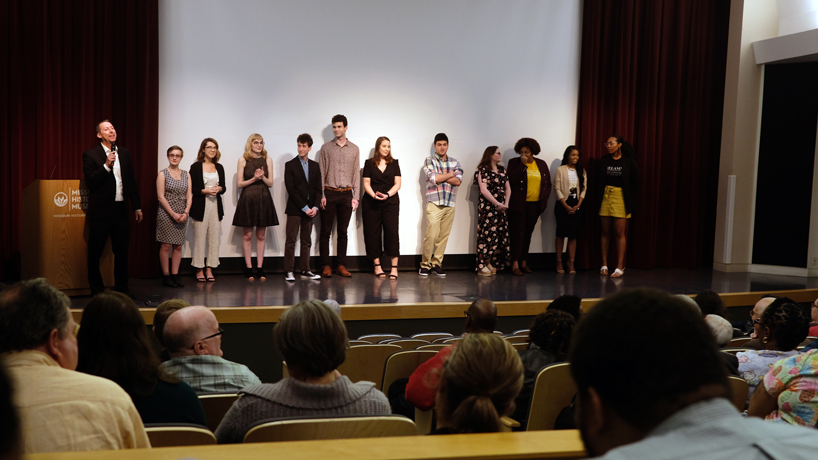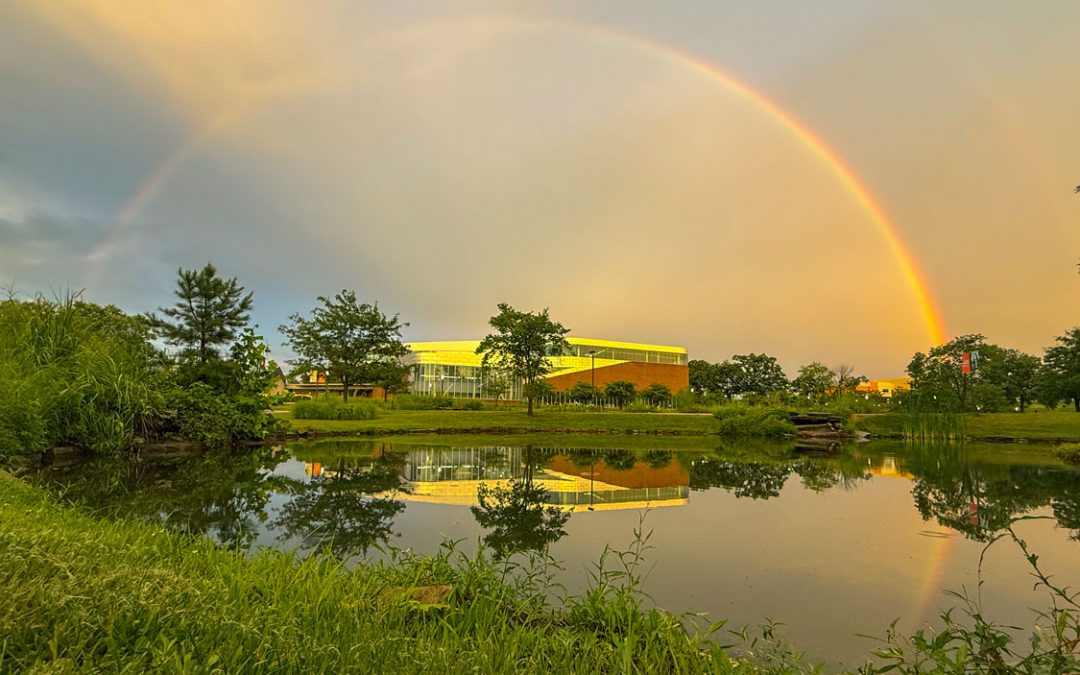
Adjunct instructor Rob Wilson (at left) and students in his “Beyond the Buildings” course respond to an audience question after showing their four-minute films May 2 at the Missouri History Museum. (Photo by Sara Bell)
Katie Showers was well versed in stories from the Civil Rights Era.
She knew about the marches, other protests and the national reaction to Martin Luther King Jr.’s assassination. The University of Missouri–St. Louis student grew up hearing firsthand accounts.
But searching for her former teacher, Ida Odom, and sitting face to face with the activist reminded Showers about the importance of listening to and logging the voices of history.
“I think talking with her hit home that not only are these stories important, it’s also important that she gets to tell her story and that other people hear it,” Showers said. “She’s not Rosa Parks. She’s not Dr. King. She doesn’t have that name, but she’s just as important.”
It’s a lesson that will remain with Showers thanks to a project in a Pierre Laclede Honors College course.
“Beyond the Buildings,” taught by adjunct instructor Rob Wilson, challenged students to interview St. Louis civil rights figures and then produce four-minute historical documentaries from the conversations. The class, which is in its fourth offering, is one of Wilson’s service-learning courses designed to create opportunities for community engagement and extend learning beyond the boundaries of textbooks and classrooms.
“I find too many times that students don’t realize what they are learning in college,” Wilson said. “When you take them out of the classroom and they are engaged in the community, you can see them get excited by the importance of their work. This will be a class that they will remember.”
During each offering, Wilson selects a theme for the semester focused on the history of St. Louis. The class learns through books and discussions, but students also take bus tours of the city, meet with community members, visit local museums and create capstone documentaries.
Each of the 11 students was responsible for directing a short film focused on an individual activist during the spring semester. A few of those featured are Percy Green II – the demonstrator known for climbing the Gateway Arch to fight for fair minority employment – and Bernie Hayes, a legendary St. Louis journalist.
With the exception of Odom, who Showers suggested, Wilson recruited the interviewees and connected them to students. The topics discussed ranged from calls for social justice in the 1950s to current movements in the St. Louis region.
“We have a tendency to look at things from our own representation and how we grew up,” Wilson said. “I think it’s important that we see things through the eyes of others. None of us have been in the Civil Rights Movement. We have not walked the front lines. We can read about it all we want, but when you listen to the stories it’s riveting and becomes more real.”
To further their community engagement, students presented the 11 documentaries May 2 at the Missouri History Museum.
“These students went from being very nervous at the beginning of the semester to confident in the end and proud,” Wilson said. “They are so excited that this is what they have created, so much more so than if they had just done a research paper. It means something to them.”
Christina Richardson, a liberal studies student minoring in art history, was interested in enrolling because of the film elements of the class. She had little experience in interviewing or producing but gained confidence through the help of GoodVoice, an organization that aims to amplify the voices of St. Louis youth through design, social learning and digital storytelling.
Wilson enlisted the experts at GoodVoice to teach the technical aspects of the course and additionally partnered with the Missouri Historical Society and the Landmarks Association of St. Louis.
“If anybody has the ability to take a class like this, they should,” Richardson said. “It’s a learning experience like no other. You just learn so much from classes like this. There has been a disconnect between some of the people in our communities. This class makes you more comfortable talking to people and asking simple questions so that you can get to know others in your community. You learn to better appreciate people.”
Ultimately, Wilson hopes that having students listen directly to stories of civil rights leaders will extend their understanding and encourage continued community engagement.
Showers believes the course has done just that.
“This class taught me not just the art of connecting but listening,” she said. “It’s so important when someone is talking to let them finish, see where it’s going and get the story. We could make four-minute documentaries literally about anyone. A lot of people don’t think that everything they have to say is important or that they didn’t make enough of a contribution. The truth of the matter is that they have.”














